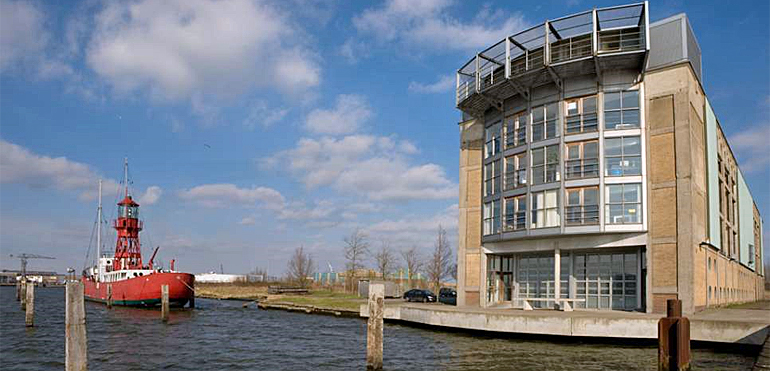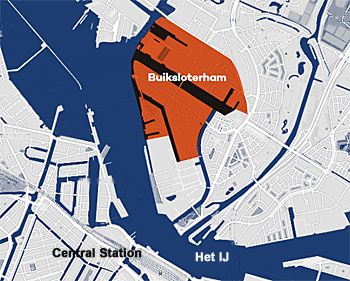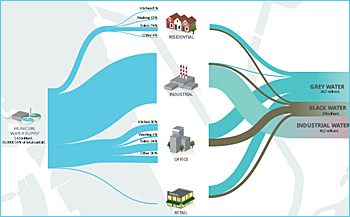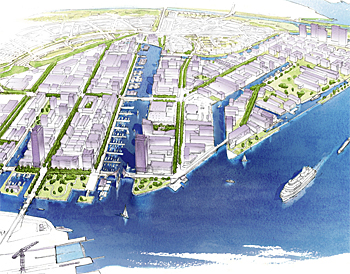Amsterdam to transfer polluted industrial site into showcase circular biobased economy
 Buiksloterham district of Amsterdam has been designated to become a living lab for circular economy. Explored aspects include the concept of living with water and the reclaiming residual materials from sewage.
Buiksloterham district of Amsterdam has been designated to become a living lab for circular economy. Explored aspects include the concept of living with water and the reclaiming residual materials from sewage.
The project is designed by Institute for Advanced Metropolitan Solutions (AMS Institute) and Alterra Wageningen is one the participating research institutes.
On 4 June the project will officially be launched.
 Urgent transition to circular cities
Urgent transition to circular cities
Cities are responsible for the consumption of no less than 75 percent of the world’s natural resources and 60 – 80 percent of all greenhouse gas emissions. The need for transition to circular cities is becoming increasingly urgent.
Within this context the city of Amsterdam assigned the Buiksloterham district as a Living Lab for circular area development.
Recently 20 parties signed the Circular Buiksloterham manifesto for the development of an action plan to transform the district into a neighbourhood in which products and raw materials are reused as much as possible.
Extracting value from waste water
In the water panel, Wageningen UR joins promoters who wish to get more value out of water-related activities.
"For instance, we are examining the possibilities for reclaiming residual materials from sewage", researcher De Haas of Alterra Wageningen UR explains. "The technology we aim to use to recover phosphates from wastewater, can be very valuable in applications on a larger scale. The looming shortage of phosphate may be a threat to world food security; without phosphate, there will be no food."
 Main water user in the district at this moment is the industry. In the next 20 years this will change to the residentials as 2,700 new homes are planned.
Main water user in the district at this moment is the industry. In the next 20 years this will change to the residentials as 2,700 new homes are planned.
Refinery of organic waste streams
The waste panel is the place for planners looking to recover useful raw materials from waste. For example, a group of homebuilders hope to apply circular building principles in the construction of their homes.
The application of smart waste collection technology gives used renewable materials a new lease on life. Organic waste streams can be turned into new biobased materials in a small biorefinery in Buiksloterham, then used as building blocks for biobased chemicals or biobased plastics.
Sharing knowledge
De Haas noted that the initiators in the district faced questions very early on. At how big a scale were they hoping to develop the idea? What regulations apply? Which technologies can be used? And, last but not least, is the idea economically viable?
De Haas: "We help idea makers with knowledge, carry out cost-benefit calculations and propose new solutions that might not have spontaneously occurred to them. We don’t always have to reinvent the wheel as there is already a great deal of technology available for initiators to use, shared by means of a knowledge platform. A web tool with relevant information will allow initiators to come into contact with partners who can help them. There will also be workshops on specific topics, such as a new sanitation system in the district."
 Rendering of the new developed Buiksloterham district, including Living with water design principles
Rendering of the new developed Buiksloterham district, including Living with water design principles.
Model for other cities
The developments in Buiksloterham will result in more than just an impressive circular district. The neighbourhood is a model for what could happen in other cities – in the Netherlands and beyond – or other parts of Amsterdam.
This largely abandoned and polluted industrial area provides plenty of space for gaining experience in circular area development.
“Buiksloterham is not just a neighbourhood in Amsterdam Noord,” De Haas points out. “It has the ambition to teach the world a great deal about the transition to the circular biobased economy.”
Adaptive Circular Cities
The project in Buiksloterham is called Adaptive Circular Cities. It is designed by the Institute for Advanced Metropolitan Solutions (AMS Institute) to encourage the development of expertise on circular area development. Wageningen UR, together with the Delft University of Technology and MIT in Boston, is a founder of the AMS Institute.
This news item was originally published on the website of Wageningen University.
More information
Wageningen University
Wageningen, the Netherlands
+31 317 48 53 74
www.wageningenur.nl/alterra
Institute for Advanced Metropolitan Solutions (AMS Institute)
Amsterdam, the Netherlands
+31 6 380 80 484
www.ams-institute.org



